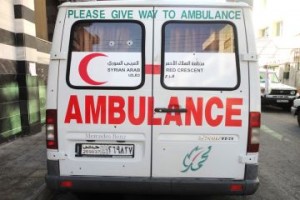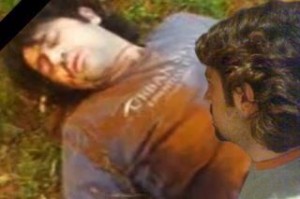 Early Saturday morning, Mohammad Mourey set off from Turkey, carrying a tall black backpack filled with some 50 pounds of blood, antibiotics, sutures and other medical supplies bound for Syria.
Early Saturday morning, Mohammad Mourey set off from Turkey, carrying a tall black backpack filled with some 50 pounds of blood, antibiotics, sutures and other medical supplies bound for Syria.
Hours later he would return to Turkey, his mission thwarted and overtaken by the death of a friend.
Over the past six months, the 33-year-old Syrian pharmacist has slipped into the country more than 20 times to deliver supplies for makeshift field hospitals for opponents of Syrian President Bashar al-Assad, he said in an interview before the trip. But as Syrian security forces have tightened their grip on the border, the crossings have become longer and more perilous—three hours of walking and crawling, followed by motorcycle and car rides.
Nine months after the Assad regime began a harsh crackdown on opposition protests, wounded activists in Syria are avoiding the country’s official hospitals. Suspected protesters brought there for treatment have been tortured by security officials, detainees and doctors have said. Witnesses and victims have reported torture, beatings and killings at military hospitals, the United Nations’ Human Rights Council said in a report issued last month.
Mr. Assad’s opponents have come to depend on the field hospitals supplied by a loose network of smugglers such as Mr. Mourey. But the facilities are poorly stocked, in part as Syrian security forces attempt to prevent the cross-border flow of supplies, weapons and potentially fighters.
On Saturday, Mr. Mourey had been due to meet Ibrahim Othman, a founder of the Physicians Coordinating Committee in Damascus and a young doctor whose attempts to save and protect protesters gained him the moniker “Doctor of the Revolution.” The two were planning to work out details on setting up a treatment center near the border, Mr. Mourey said by telephone Monday.
Over the weekend, Mr. Mourey recalled, a network of activists working along the border area had warned them of a stronger-than-usual buildup of regime forces. After Mr. Mourey crossed into Syria, he began to get messages from the network that a line of army and security officers were blocking one of their usual routes.
 Shortly after, he says, he learned from activists that Mr. Othman had been shot dead by a sniper as he reached the border. “There were areas that we thought were totally safe,” Mr. Mourey said. “But it turns out there are informers.”
Shortly after, he says, he learned from activists that Mr. Othman had been shot dead by a sniper as he reached the border. “There were areas that we thought were totally safe,” Mr. Mourey said. “But it turns out there are informers.”
Activists on Saturday reported Mr. Othman had been shot by security forces trying to flee to Turkey. They circulated a video said to show the young doctor, in blue jeans and a long-sleeve T-shirt, lying in the dirt after he was shot. The person shooting the footage holds Mr. Othman’s passport up to the camera.
Turkey has become the main entry point to Syria for opposition smuggling networks, said Jamil Saib, a Syrian refugee who organizes sending medical equipment, satellite phones, cameras and other supplies into Syria from the Turkish city of Antakya. Security forces had gone a long way toward sealing Syria’s borders with Lebanon and Jordan, he said.
The opposition hospitals—in tents, rooms of private homes or remote buildings—remain in place for a few hours or days but not more than a week, say people who have visited them.
According to one Syrian opposition activist inside the country, civilians contact local opposition members when someone is hurt. They in turn alert sympathetic doctors and nurses. Soon a makeshift triage unit is under way.
Often, no doctor can be found willing to run the risk of treating opposition casualties. Mr. Othman was one.
Mr. Mourey said he, too, often cleans up and sews wounds, deploying the medical training he received during his pharmaceutical studies. Blood is in particularly short supply, he said. So are sterilized surgical implements. “Hygiene is really difficult,” he said.
Mr. Mourey said most activist networks hadn’t known his friend, Mr. Othman, had been on his way to the border to plan another treatment center.
“I had told him not to come anymore,” he said. “But he took risks.”
The activist inside Syria and another medical-supplies smuggler vouched for Mr. Mourey’s role.
The network appears to be loosely organized on the Turkish side of the border. One group, whose leaders declined to be identified, recently set up a bureau to handle donations from expatriate Syrians and use them to buy supplies. Mr. Saib said he hasn’t joined them. Both networks said they received no funds from the Syrian National Council, Syria’s main opposition group.
The council said it doesn’t provide aid into Syria, although individual members may donate to aid efforts. “We don’t have any official channels, but we help where, when and how we can,” said Bassma Kodmani, an SNC spokeswoman.
As Mr. Saib spoke in a café in Antakya, a mainly ethnic-Arab city on Turkey’s border with Syria, he got a call from couriers bringing a carload of medical equipment from Germany, who had been stopped at Turkey’s border with Bulgaria. “We’ll sort it out,” he said, flipping open a netbook.
According to Mohammed Abu Muttii, a Syrian refugee responsible for gathering information from the Syrian side of the border, as soon as couriers reach the other side the Free Syrian Army takes over, directing where medical and other supplies should be taken.
Free Syrian Army units have become increasingly active lately, adding to their initial role of guarding protests and securing roads to carrying out attacks on the Syrian military, activities that are creating fresh demand for the makeshift field hospitals.
Like most men who have taken refuge along Turkey’s long border with Syria since the violence began, Abu Muttii has registered with the Free Syrian Army. “We’re just waiting for orders, and a weapon,” said his brother Samir, who said he has given up smoking and begun physical training in anticipation of being called up.

Leave a Reply
You must be logged in to post a comment.